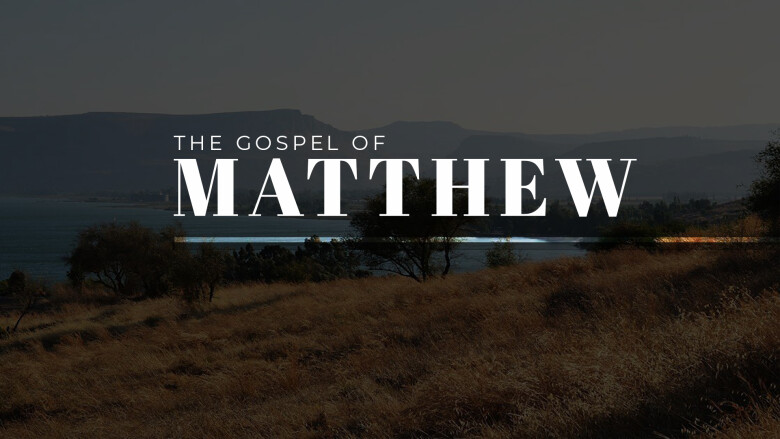Matthew
Jul 07, 2024 | Sam McCabe
Out With the Old, in With the New
Embracing the New: A Journey Through Matthew 9:14-17
If you've been attending Restoration for the last few months, you know we've been journeying through the Gospel of Matthew. Today, we dive into Matthew 9:14-17, a passage that, at first glance, may seem cryptic and mysterious. Jesus uses imagery that might feel unfamiliar, but as we unpack this scripture, we'll see that His words hold monumental importance for our lives.
The Context
The scene is set at Matthew's house, where Jesus is dining with tax collectors and sinners. The Pharisees, observing this, question Jesus' choice of company. Jesus responds by emphasizing His mission: He has come for the sick, not the well, to save sinners. He quotes the minor prophet Hosea, stating, "I desire mercy, not sacrifice."
Immediately following this, the disciples of John the Baptist pose another question to Jesus: "Why do we and the Pharisees fast often, but your disciples do not fast?" Jesus' response, laden with metaphor, transcends the surface issue of fasting to address deeper spiritual truths.
The Heart of Fasting
At first glance, one might assume the primary subject here is fasting. However, Jesus is not critiquing the practice itself, as He too engaged in fasting. Rather, He criticizes the motivation behind it. The disciples of John the Baptist and the Pharisees fast as a performative religious ritual. In contrast, biblical fasting is an act of desperation and humility, an outward sign of inward repentance and conviction.
Jesus draws attention to the incongruity between the outward actions and the inner reality. He rebukes the Pharisees and John's disciples for their performative fasting, likening them to whitewashed tombs—appearing righteous outwardly but spiritually dead inside. This disconnect between inner reality and outward action is a central theme in Jesus' teaching.
The New and the Old
Jesus then shifts to a powerful metaphor: "No one puts a piece of unshrunk cloth on an old garment, for the patch pulls away from the garment, and the tear is made worse. Nor do they put new wine into old wineskins, or else the wineskins break. But they put new wine into new wineskins, and both are preserved."
Here, Jesus invites us to leave behind the old and embrace the new. This concept is vividly illustrated by the launch of the first iPhone in 2007. People queued for days, eager to embrace a technology that promised to change their lives. Similarly, Jesus calls us to abandon our old ways and embrace the new life He offers, even though it requires sacrifice.
The Bridegroom
Jesus' reference to Himself as the bridegroom is a profound declaration of His identity. John the Baptist had previously identified himself as merely a friend of the bridegroom, paving the way for Jesus. In calling Himself the bridegroom, Jesus is fulfilling Old Testament prophecy, signaling the arrival of God's new covenant with His people.
The prophet Hosea foretold a time when God would betroth His people to Himself, establishing a new covenant based on righteousness, justice, loving-kindness, and mercy. Jesus, as the bridegroom, embodies this new covenant, calling us to a relationship not based on our faithfulness but on His.
A Call to Transformation
Jesus is not interested in being a mere addition to our old lives. He demands total transformation. The Apostle Paul echoes this in Romans 8:1-4, emphasizing that there is no condemnation for those in Christ, who walk according to the Spirit, not the flesh.
Many of us try to incorporate Jesus into our pre-existing lives, but true transformation requires complete surrender. This may mean confronting deep-seated issues and sins we've kept hidden. As personal testimony reveals, true freedom and resurrection life come when we fully submit to Christ.
Overcoming Obstacles
Two significant obstacles hinder our full surrender to Jesus: self-deception and self-perception. We may convince ourselves that minor adjustments are sufficient or fear the judgment of others if we fully confess our sins and struggles. However, until we prioritize God's opinion over others, genuine change remains elusive.
The Invitation
Today, Jesus extends an invitation to embrace the new life He offers. This requires leaving behind old ways and surrendering entirely to His transformative power. It's a call to move beyond surface-level religion to a deep, authentic relationship with Christ.
If you feel the Holy Spirit's nudge, don't resist. Whether you're struggling with hidden sins or have grown cold in your faith, the invitation is open. Embrace the new life Jesus offers and experience the freedom and transformation that come with full surrender to Him.
Series Information

Join us as we embark on a transformative journey through the Gospel of Matthew, exploring the profound teachings and events that define this pivotal book of the New Testament. This series will delve into the core messages of Jesus, from the Sermon on the Mount to His parables, miracles, and the ultimate sacrifice of His life.
Throughout this series, we will uncover themes of faith, righteousness, humility, and divine authority, as well as the cost of discipleship and the call to immediate and wholehearted commitment. Each week, we will explore different aspects of Jesus' ministry, including healing, prayer, true righteousness, and the challenges of living out His teachings.
We will examine the principles Jesus laid out for living a life aligned with God's will, from understanding true blessedness and the nature of God's kingdom to embracing radical love, mercy, and the immediate call to follow Him. This series aims to deepen our faith and challenge us to live out the values of Jesus' teachings in our daily lives.
Join us for the "Matthew" series and discover how the teachings and life of Jesus can transform your heart and mind, guiding you to a more meaningful and fulfilling walk with Christ.
